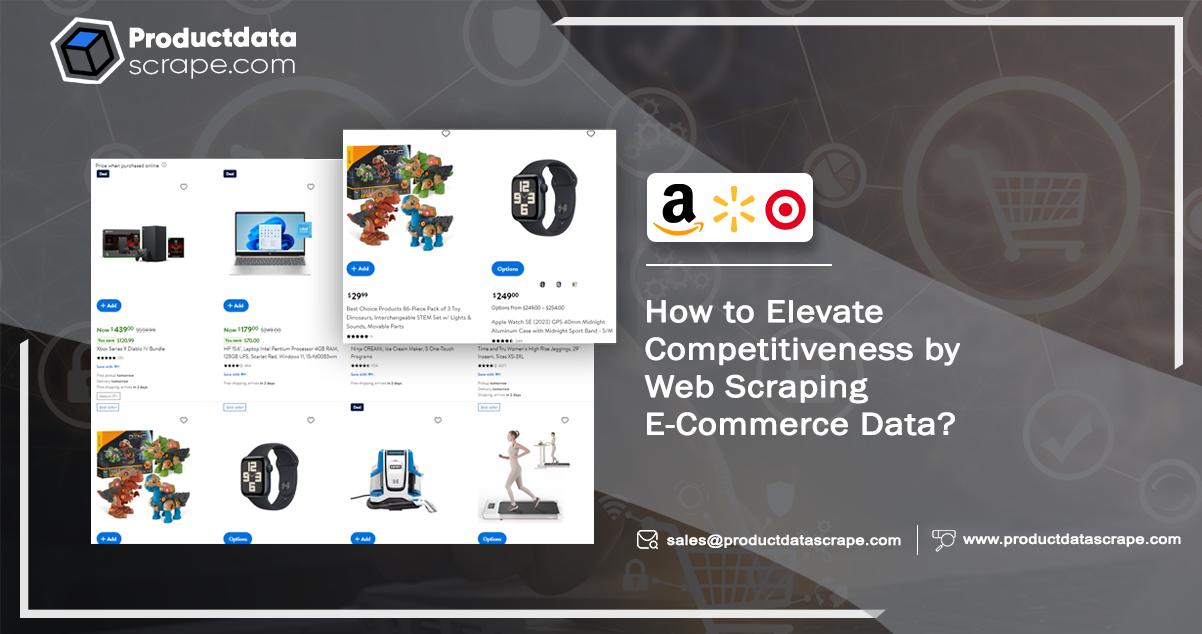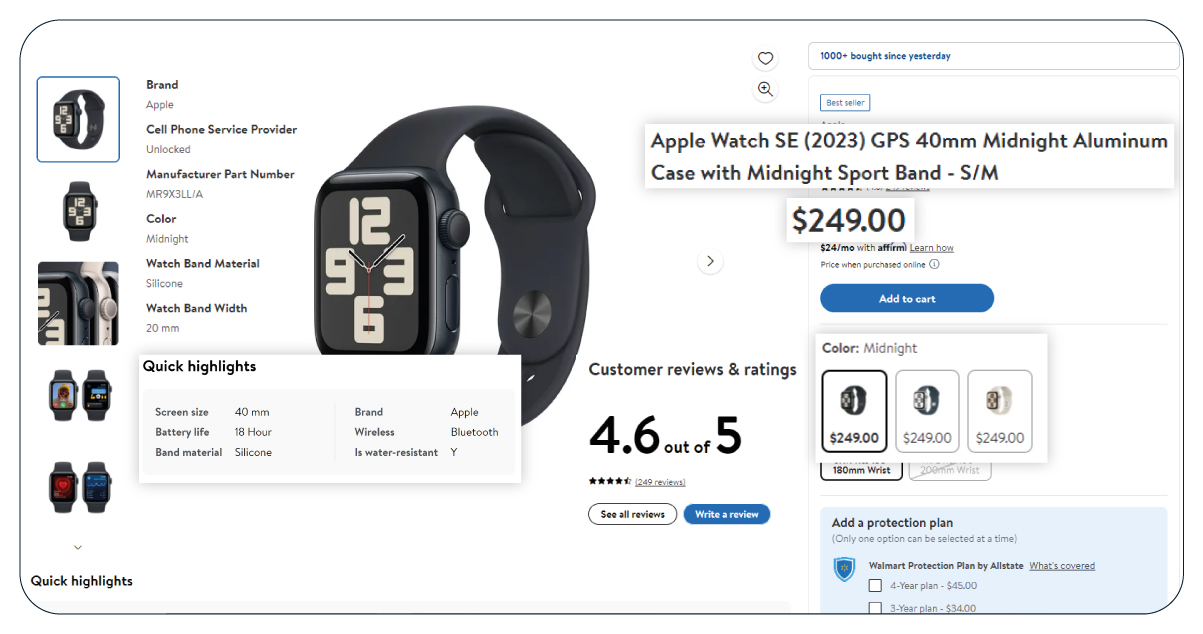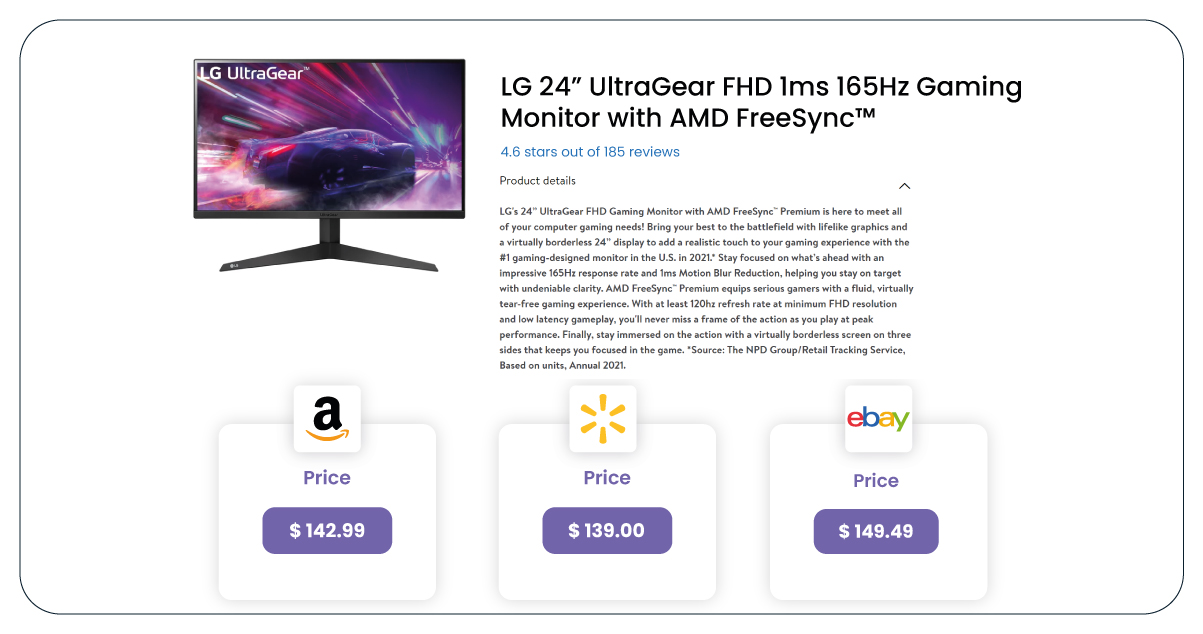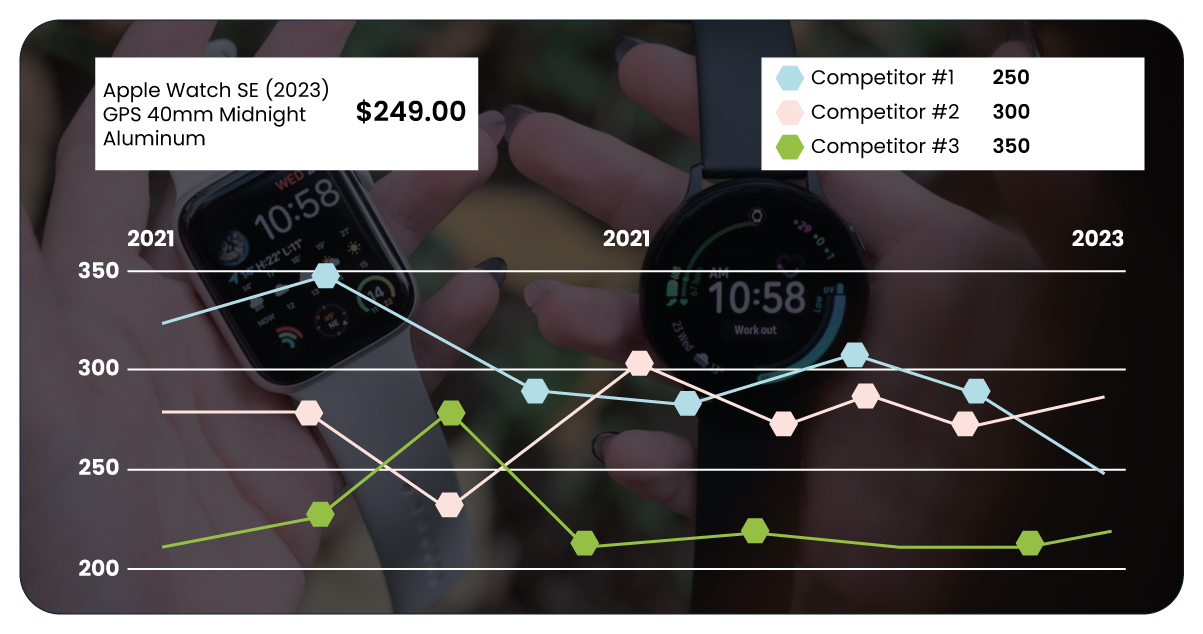
To differentiate yourself in a competitive landscape, acquiring competitor data is essential for adapting strategies, identifying industry best practices, and anticipating future trends. Employing an eCommerce web scraper proves invaluable for this purpose.
Web scraping, a potent data collection method, enables the extraction of diverse information from websites effortlessly transferred to spreadsheets and databases. While web scraping may seem complex, utilizing an Application Programming Interface (API) simplifies the process. Automation through an API streamlines repetitive tasks associated with manual scraping, conserving time and energy for more impactful endeavors. Harnessing the potential of web scraping e-commerce data provides invaluable insights that empower enterprises to make informed decisions, optimize operations, and enhance the overall customer experience. This piece delves into the advantages of web scraping in e-commerce, extending beyond price monitoring. Additionally, it explores the broader applications of web scraping in this industry and outlines key considerations when selecting an appropriate web scraping service provider.
List of Data Fields

- Product Name
- Description
- SKU
- Category
- Brand
- Price
- Availability
- Ratings
- Reviews
- Product Images
- Specifications
- URLs
The Advantages of Employing eCommerce Scrapers for Entrepreneurs

Here's how entrepreneurs can leverage eCommerce scrapers for various strategic advantages:
1. Price Tracking and Comparison:

eCommerce businesses employ scrapers to gather and analyze competitor pricing data efficiently. Manually researching numerous competitors is time-consuming, making automated scraping a necessity. By programming eCommerce price scrapers to extract specific data categories, businesses can promptly adjust their prices based on market trends.
2. Customer Preferences and Market Research:

Understanding customer needs is crucial in eCommerce. eCommerce data scrapers assist in extracting and analyzing competitors' product and service offerings, facilitating business expansion ideas. By compiling lists of competitors' products and services, businesses can identify opportunities for differentiation. Data scraping also enables predictive and sentiment analysis through social media platforms, providing insights into consumer preferences and opinions.
3. Lead Generation:

Scrapers play a vital role in lead generation by extracting data from competitors' social media profiles and websites. Identifying issues faced by competitors in selling products allows businesses to address concerns and attract more customers proactively. Scraping popular blogs and news websites reveals industry trends, helping businesses tailor their offerings to stand out.
4. SEO Analysis:

E-commerce data scraping services provide a competitive advantage in SEO analysis. Extracting data from competitors' websites unveils crucial SEO information, including meta descriptions, titles, keyword density, and content strategies. Analyzing successful competitors' SEO techniques allows businesses to enhance their strategies, ultimately improving search engine rankings.
Advantages of Utilizing Web Scraping in E-commerce

A. Real-time Insights
Web scraping allows e-commerce entities to access up-to-the-minute data encompassing product specifics, customer feedback, and pricing from diverse online platforms. This aggregated information provides valuable real-time insights into market trends, consumer behavior, and product performance. With this dynamic data, businesses can swiftly adapt to market shifts, ensuring heightened competitiveness.
B. Informed Decision-Making
Access to comprehensive data allows e-commerce businesses to make informed, data-driven decisions. Analysis of web-scraped data reveals patterns, trends, and potential opportunities, aiding in pricing strategies, inventory optimization, and identifying growth areas. Improved decision-making, rooted in robust data analysis, contributes to overall business success.
C. Operational Efficiency and Time Optimization
Web scraping automates data collection, reducing reliance on manual entry and minimizing errors. This automation saves time and resources and allows businesses to focus on data analysis and strategic planning. Streamlining inventory management through web scraping enhances operational efficiency, ensuring product availability while mitigating the risk of stockouts.
Price Monitoring Essentials

Web scraping plays a pivotal role in e-commerce, especially in price monitoring. Regularly extracting data from competitor websites and online marketplaces enables businesses to keep a real-time price tab. It ensures competitiveness and facilitates strategic adjustments in pricing for maximum profitability.
The process of price monitoring through web scraping involves extracting detailed product information such as prices, discounts, and product descriptions. This trove of data goes beyond mere price comparisons; it empowers businesses to analyze competitors' pricing strategies, discern pricing trends, and make informed decisions to optimize their pricing strategies.
Diverse Data Beyond Prices
While price monitoring is a primary focus, scrape e-commerce data to unlock a spectrum of additional data for e-commerce enterprises. This comprehensive approach extends beyond prices to encompass various valuable areas, enriching businesses with insights beyond competitive pricing.
A. Monitoring Product Availability and Optimizing Inventory
Utilizing web scraping for e-commerce data allows businesses to track product availability across diverse platforms. By scraping information on stock levels, companies can ensure popular products remain in stock, reducing the risk of lost sales due to stockouts. This data also aids in demand forecasting, optimizing inventory levels, and enhancing order fulfillment efficiency, ultimately minimizing carrying costs.
B. In-depth competitor Analysis and Market Insight
Critical to e-commerce success, web scraping facilitates comprehensive competitor analysis. It enables businesses to gather data on competitor products, pricing strategies, promotions, and customer reviews. Understanding how competitors position themselves informs strategic decisions on pricing, product selection, and marketing, providing a competitive advantage.
Moreover, web scraping helps businesses monitor market trends and consumer preferences. Analyzing data from social media, forums, and review sites identifies emerging trends, customer sentiment, and product preferences. This insight informs the development of new products, tailoring marketing strategies, and staying ahead in a dynamic market.
C. Digital Shelf Optimization
Web scraping e-commerce data offers insights into product presentation and categorization on online platforms. Monitoring product placement enables businesses to optimize listings, improving discoverability. Analysis includes keywords, product descriptions, images, and reviews to enhance visibility and conversion rates, ensuring a strategic online presence.
D. Monitoring MAP Policy Compliance
Guarding against Minimum Advertised Price (MAP) violations is crucial for sales and brand integrity. Web scraping aids businesses in monitoring online retailers and marketplaces for MAP policy compliance. Identifying consistent violators allows for proactive measures, safeguarding the brand and maintaining pricing integrity.
E. Customer Experience Enhancement Through Data
Web scraping not only yields insights but also enhances the customer experience. Analyzing customer reviews and feedback identifies areas for improvement, addressing product issues, refining customer service, and implementing changes to boost satisfaction. Timely responsiveness to customer concerns builds loyalty, fostering repeat business and sustained success.
Choosing the Ideal Web Scraping Service Provider
Selecting a trustworthy web scraping service provider is paramount for e-commerce enterprises. Consider the following factors:
- Experience and Reputation: Opt for a provider with a proven track record in e-commerce web scraping. Assess their reliability and professionalism through customer reviews and testimonials.
- Scalability: Ensure the service provider can handle substantial data volumes and possesses the capacity to scale services as your business expands.
- Data Accuracy: Accurate data is essential for informed decision-making. Choose a provider utilizing advanced data extraction techniques to guarantee precision and reliability.
- Customization and Flexibility: Prioritize providers capable of tailoring scraping services to your business needs. Flexibility in data formats and delivery methods is also crucial.
- Compliance: Verify that the chosen provider strictly complies with the website’s terms of service and legal requirements related to data scraping.
Significance of Real-Time Data in E-commerce Operations
In e-commerce, the velocity of collecting user data is staggering, offering invaluable insights for strategic planning and business development. While even basic user information like age or online activity aids in crafting essential strategies, the true power of personalization lies in the intricate processing of big data. Real-time data is pivotal for long-term planning and day-to-day operations, serving as a dynamic tool for immediate decision-making.
The primary applications of real-time metrics in e-commerce are:
Managing Day-to-Day Operations:
Real-time metrics play a crucial role in efficiently managing daily business operations. These metrics provide swift insights that aid in making informed decisions on a day-to-day basis.
Identifying Sudden Problems or Errors:
Quickly identifying and responding to sudden issues or errors is a crucial advantage of real-time data. Immediate detection allows for prompt corrective action, preventing potential disruptions.
Key E-commerce Metrics for Real-Time Tracking:
- Website Traffic through Marketing Channels: Monitoring traffic in real-time helps identify sudden spikes, offering insights into potential issues such as competitor bots or viral social media posts. Take immediate action depending on the source of the traffic.
- Cumulative Daily Revenue: Tracking daily revenue in real-time ensures business performance aligns with expectations. This metric is instrumental in identifying the highest revenue days and addressing deviations.
- Site Speed by Platform: Real-time monitoring of site speed enables the rapid detection of performance issues. A sudden drop in speed is an early warning sign, allowing for immediate investigation and resolution.
- Number of HTTP Errors by Site Platform: Monitoring HTTP errors in real-time helps identify site issues. For instance, a spike in 404 errors may signal a broken link in marketing materials, prompting swift correction to maintain a seamless user experience.
Conclusion: The role of web scraping in the e-commerce sector extends well beyond price monitoring. With advancements in web scraping technologies, businesses can access real-time data insights, enabling informed decision-making, operational enhancements, and an elevated customer experience. Web scraping of e-commerce data presents diverse opportunities, encompassing price monitoring, market trend analysis, and ensuring optimal inventory levels.
When selecting a web scraping service provider, assess their experience, reputation, scalability, data accuracy, customization options, and adherence to legal requirements. By harnessing web scraping capabilities, e-commerce enterprises can establish a competitive edge in the dynamic landscape of online retail.
At Product Data Scrape, we maintain steadfast ethical standards across all operations, be it our Competitor Price Monitoring Services or Mobile App Data Scraping. With a worldwide presence spanning multiple offices, we consistently deliver exceptional and transparent services to meet the diverse needs of our valued clients.








































.webp)






